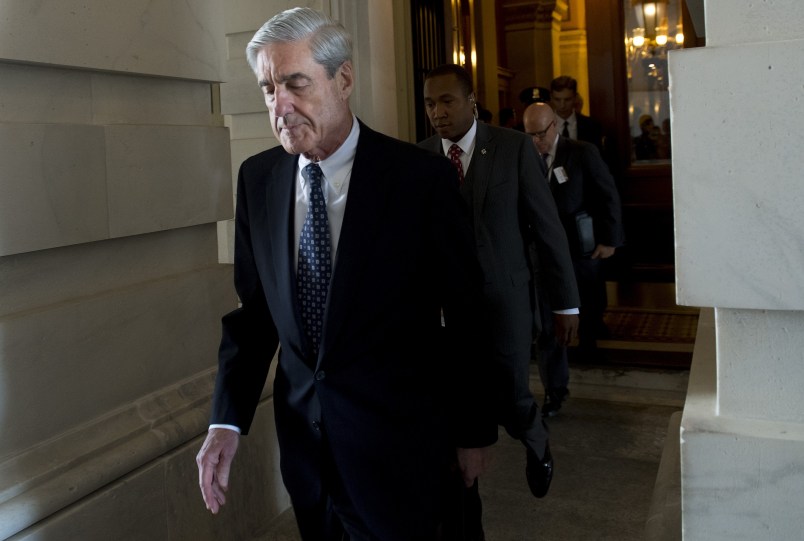More details were revealed Thursday about the fight over a grand jury subpoena issued for an unknown foreign-owned company in special counsel Robert Mueller’s investigation, with the unsealing of six orders and opinions handed down by a federal judge at various stages in the dispute.
The opinions contain significant redactions and the major questions — who the company is, what country owns it and where it fits into Mueller’s investigation — remain a mystery.
But thanks to the newly-unsealed docs, we now know more about when the company was subpoenaed and its initial response. The documents also show that in January 2019 there was a discussion between the company’s U.S. lawyers, the prosecutors and the judge about what kind of public comment, if any, they should be able to make in the highly secretive case, which first caught reporters’ attention last fall.
Additionally, the unsealed docs revealed that the company is already facing more than $2 million in fines for resisting the subpoena.
The company, which argues it’s exempt from the subpoena under the Foreign Sovereign Immunities Act, has requested that the Supreme Court take up the case. In a filing with the court Wednesday, it urged the justices to “stop the damage to Country A’s sovereign dignity.”
The grand jury first issued the subpoena on July 11, 2018, and Mueller’s office gave the company until July 27 to produce the requested records. The day before the deadline, the company’s lawyers raised concerns about complying with the subpoena, pointing to the Foreign Immune Sovereign Act, while claiming that the company “wishes to cooperate with the Special Counsel’s investigation.” Negotiations over the terms of the compliance continued — with the company claiming it was beginning to pull together the records — and Mueller’s office gave the company two extensions, through August 16, while warning it would not push back the deadline any further.
The company asked for another extension nonetheless. When Mueller denied it, it kicked off the court fight on August 16, leading to U.S. District Judge Beryl Howell’s first opinion, on September 19, upholding Mueller’s subpoena.
After the company’s appeal of her decision was deemed premature, it was back in her court for a contempt hearing on October 5. Her order holding them in contempt for resisting the subpoena included a $50,000-per-day fine for non-compliance — well above the $10,000 originally proposed by Mueller’s team.

In November, an appeals court heard closed-door arguments in the case and announced the following month its ruling in favor of upholding the subpoena. The company then took the case to the Supreme Court, which on January 8 denied its request to pause Howell’s original order upholding the subpoena.
By then, the case was also back in front of Howell, who is the chief judge of the U.S. District Court in D.C. Over the course of the month of January, she handed four separate orders addressing a variety of disputes. One order addressed a request by the company’s lawyers that they be allowed to make a public statement about the case. At a Jan. 10 status conference, they told Howell that they had received threatening messages, her opinion said, but prosecutors opposed them being allowed to make a public statement.
Many of the details of that debate were redacted, but Howell landed on banning the company’s lawyers from commenting on information in the case that was not already public. In a later order, she clarified that the lawyers could not make any comments indicating the identity of company involved.
Another issue she dealt with was a procedurally weedy one: the company sought that she rule on whether the Foreign Sovereign Immunities Act allows for the enforcement the contempt order and its fines — by seizing property or otherwise.
The government had made no such move to try to enforce the collection of the fines— and doing so would require the court’s permission, regardless. Howell denied the company’s request to decide the issue.
She also clarified in one of the January orders exactly when the accrual of the contempt fines was to begin, given that Howell’s order had been paused at various points in the proceeding. The court ruled that the fines started accruing on January 15, 2019, meaning that, as of Thursday, the company is facing some $2.2 million in fines.
Read the unsealed documents below:






